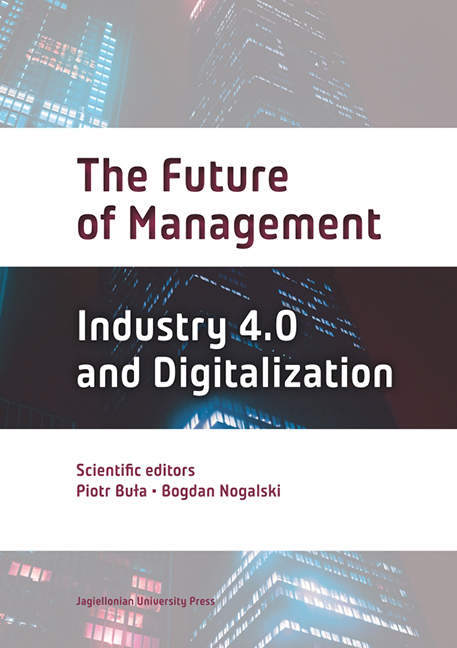Book contents
- Frontmatter
- Contents
- Preface
- Industry 4.0: Social Impacts and Operations Management Challenges
- Business Model Changes in the Presence of Challenges Brought by Industry 4.0
- Communication in Traditional and Network Organisation: Transformation
- Consequences of the Fourth Industrial Revolution in Social and Economic Development in the 21st Century
- Ideology, Trust, and Spirituality: A Framework for Management Control Research in the Era of Industry 4.0
- Renewable Energy through Industry 4.0 on the Example of Photovoltaic Development in Selected European Countries
- Employee Loyalty in the ICT Sector as a Challenge for Building Industry 4.0
- The Importance of Flexibility of Human, Tangible and Intangible Resources in Selected Production Entrepreneurships: Results of Empirical Research
- Challenges Posed for Universities by the Industry 4.0 Environment
- Big Data in Managing Marketing Communication
- Mathematical Risk Assessment Method in the Implementation of Logistic Processes
- Management and Digitisation
- Branding of Time as a New Direction in Tomorrow’s Management
- The Future of Branding
Management and Digitisation
Published online by Cambridge University Press: 16 November 2021
- Frontmatter
- Contents
- Preface
- Industry 4.0: Social Impacts and Operations Management Challenges
- Business Model Changes in the Presence of Challenges Brought by Industry 4.0
- Communication in Traditional and Network Organisation: Transformation
- Consequences of the Fourth Industrial Revolution in Social and Economic Development in the 21st Century
- Ideology, Trust, and Spirituality: A Framework for Management Control Research in the Era of Industry 4.0
- Renewable Energy through Industry 4.0 on the Example of Photovoltaic Development in Selected European Countries
- Employee Loyalty in the ICT Sector as a Challenge for Building Industry 4.0
- The Importance of Flexibility of Human, Tangible and Intangible Resources in Selected Production Entrepreneurships: Results of Empirical Research
- Challenges Posed for Universities by the Industry 4.0 Environment
- Big Data in Managing Marketing Communication
- Mathematical Risk Assessment Method in the Implementation of Logistic Processes
- Management and Digitisation
- Branding of Time as a New Direction in Tomorrow’s Management
- The Future of Branding
Summary
Abstract
The article is devoted to the phenomena of digitalization. It describes what changes the digitalization brings and how to deal with those changes. The text uses the framework of Integrated Management and based on it the author describes how to approach process and systemic changes. It can be achieved through horizontal and vertical integration of organization internal activities.
Keywords: digitalization, Industry 4.0, St. Gallen management concept, systemic approach, change Management
Foreword
Nothing is more practical than a good theory. As important as management sciences are, they do not guarantee successful corporate development. Who has no future-oriented basic attitude and the yesterday and the today again and again questions, wrong expectations will raise. Management science developed from various traditional scientific teachings at universities and is regarded as a recognised field of research and education. It provides findings and design recommendations from a wide variety of scientific disciplines. The interplay between business administration and management theory is characterised by different schools of thought. Although there is a wealth of specialist literature on economic problems, there are no sustainable patent solutions. K. Bleicher notes a loss of consensus on goals, content and methods, among other things.
From today's point of view, there are still further development possibilities despite numerous concepts. These are often shaped by current development trends. In particular with regard to a conclusive linkage of practice and theory there is still further need for action for the enterprise management. At present, the topic of “digitisation” gives rise to a further development of management science in the economic field. Such and similar topics often reveal great uncertainty and often lead to undesirable developments. A well-positioned management is therefore an important basis for every company. For this to be the case, management science must provide the necessary tools.
This contribution is made in memoriam for Prof. Janusz Teczke, Ph.D. It is withhim that I associate some years of common work. From this time of close personal contact I have come to know his merits as a person and scientist. His personal merit lies in the further development of the “Krakow School.”
- Type
- Chapter
- Information
- The Future of ManagementVolume Two: Industry 4.0 and Digitalization, pp. 178 - 200Publisher: Jagiellonian University PressPrint publication year: 2022

